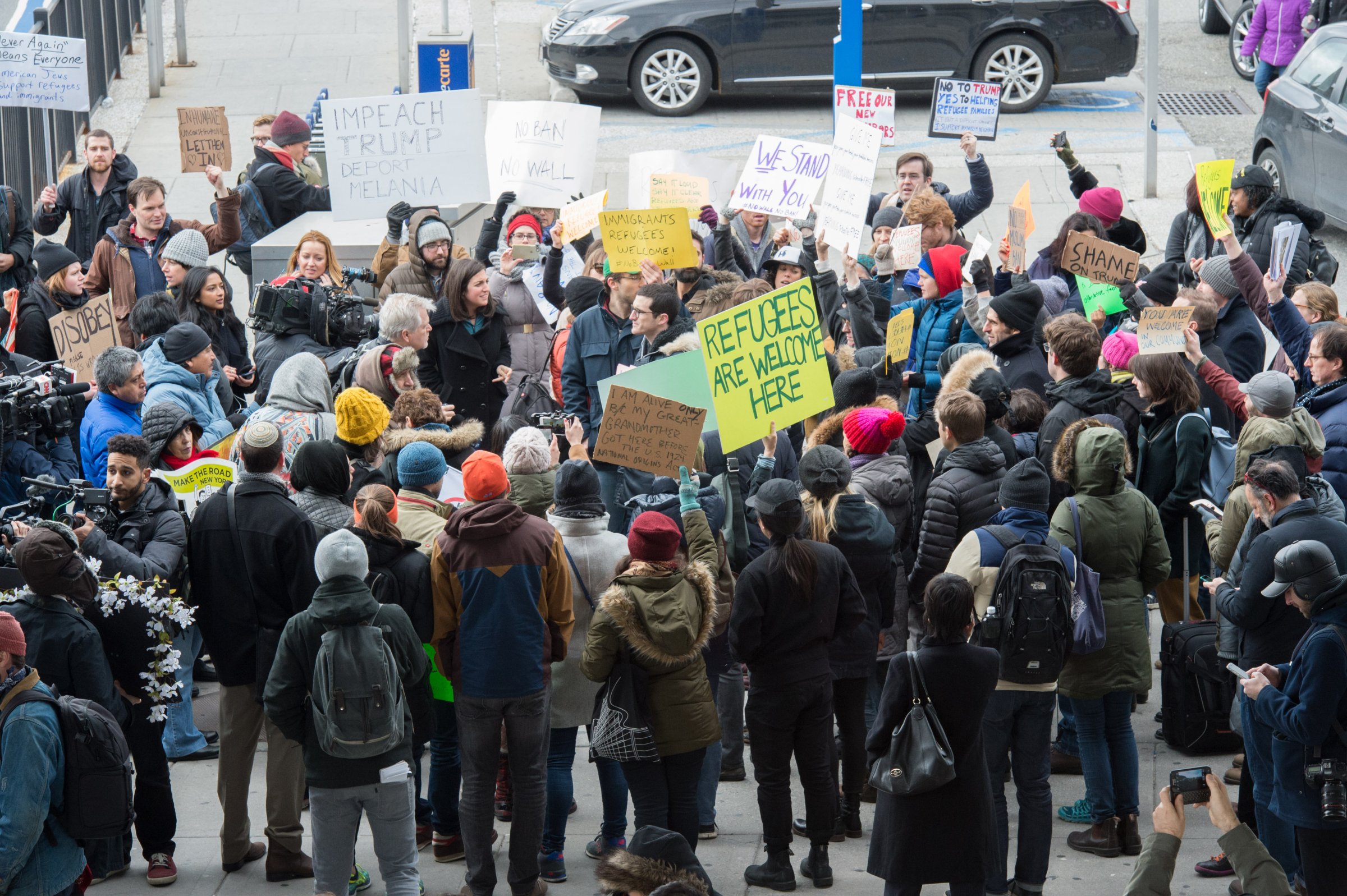
To view this video on your mobile device, download the latest version of the YouTube mobile app. When using YouTube 360°, you can watch the footage from any point of view. Simply, drag your finger on your screen or move your phone in any pattern.
Lawyers say dozens of travelers from countries named in President Trump’s recent executive order were held at John F. Kennedy International Airport and other airports Saturday amid confusion about whether they could legally enter the country. At least two of the detained were legal U.S. visa holders who were not allowed to speak to their attorneys for several hours.
“Both recipients have approved visas, got on a plane before executive order was signed, arrived and were then detained,” says Lara Finkbeiner, deputy legal director for the International Refugee Assistance Project, which represents two of the twelve detainees. “We have no idea how they’re doing.”
As of early afternoon on a Saturday, one of the detainees, Iraqi citizen Hameed Khalid Darweesh, 53, was released. Darweesh worked as an interpreter for the U.S. military in Iraq, which caused local militia to threaten his life.
Julie Kornfeld, a lawyer working to secure the release of the other known detainee Haider Sameer Abdukhaleg Alshawi, 33, said that he arrived Friday around 8:30 p.m. from Sweden. Kornfeld says his wife had been “very emotional,” and had not slept since her husband was detained. Alshawi’s family members had worked for a U.S. security contractor in Iraq.
No details are yet known about the other detainees.
Two members of congress, as well as roughly 150 protesters, were at JFK to register their objection to the ban and the detainment. They described a scene of contradictory orders and confusion regarding travelers who were already en route to the United States at the time the ban was ordered.
“When asked if the presidents executive order supersedes a valid visa, they said that they’re ‘trying to figure that out,'” said Rep. Jerrold “Jerry” Nadler, D-NY. “This whole thing is shameful.” Nadler noted the irony that the ban was signed on Holocaust Remembrance Day.
“This is not who we are. This is an affront to our American values,” said Rep. Nydia Velazquez, D-NY. “We cannot go back to those dark days in our country.”
Trump defended the order on Saturday and attempted to paint a different picture of the confusion playing out at airports around the country, characterizing it as a smooth implementation.
“We were totally prepared,” he said. “It’s working out very nicely. You see it at the airports. You see it all over. It’s working out very nicely.”
Port Authority officers at JFK expelled reporters and demonstrators from the international terminal, saying that the terminal was “private property” and that reporting was not allowed inside according to “the client.” JFK’s Terminal 4 is the only privately owned terminal in the U.S., owned and operated by JFKIAT, which is owned by a division of Amsterdam’s Schipol Group.
Nearly a dozen lawyers gathered inside Terminal 4 to offer pro-bono assistance to detained travelers, but since the names of the detained have not been released, it’s difficult for the lawyers to do their work. “We’re trying to get the word out that if people are expecting family members, reach out,” said Nisha Agarwal, Commisioner for Immigrant Affairs in NYC. lawyers for the IRAP say the best way for family members to get assistance for a detained loved one is to email their name to spoellot@refugeerights.org, with the subject line “Name of Detained Person.”
More Must-Reads from TIME
- How Donald Trump Won
- The Best Inventions of 2024
- Why Sleep Is the Key to Living Longer
- Robert Zemeckis Just Wants to Move You
- How to Break 8 Toxic Communication Habits
- Nicola Coughlan Bet on Herself—And Won
- Why Vinegar Is So Good for You
- Meet TIME's Newest Class of Next Generation Leaders
Write to Charlotte Alter at charlotte.alter@time.com